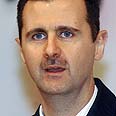
IAF foils rocket transports from Syria
While army continues to strike Hizbullah, limit its weapons resources, outside groups trying to rearm group. IAF manages to bomb trucks transporting missiles from Syria. IDF Maj.-Gen. Eisenkot: These rockets belong to Syrian army
Thus far, the IAF managed to intercept a number of trucks transporting rockets from Syria to Hizbullah, including trucks laden with the 220mm-diameter rockets with warheads like the one that hit the Haifa train depot Monday, claiming eight lives. Maj.-Gen. Eisenkot said he would be very surprised if official elements in Syria were unaware of these transports.
“These are rockets that belong to the Syrian army. You can’t find them in the Damascus market, and the Syrian government is responsible for this smuggling,” Eisenkot said, but stressed, “We are not operating against Syria or the Lebanese army.”
During the briefing, Maj.-Gen. Eisenkot said the IDF has hit over 1,000 targets, 180 of them Katyusha and rocket storage sites and 350 launch sites. Over 250 missile strikes were carried out with the aim of blocking traffic arteries, and 200 buildings used by Hizbullah were hit. According to Eisenkot, Israel’s offensive would continue without time limitations.
“With that, we always operate under the principle of a short fighting period. In the short term, this is a complicated reality for civilians too, but in the long term this operation holds great importance for all of us,” he noted. He added that senior Hizbullah leaders were hiding out in underground bunkers. “We struck a number of mid-level operatives in the organization, and not in the numbers we wished, but our energies have been aimed at taking out weapons stores and rocket launchers,” he said.
'IDF learning enemy'
At the briefing, IAF Commander Brig. Gen. Amir Eshel presented footage of an army aircraft scoring a direct hit on a truck laden with rockets, and noted that the truck was disguised as a civilian vehicle in order not to be identified.
“We are faced with very complex operations here, which demand excellent intelligence information. To thwart this, we are blocking the Lebanon-Syria border, and warplanes are constantly flying over the area,” he said. He noted that as time passes, the air force was becoming familiar with the enemy and its operations were therefore becoming more sophisticated and efficient.
The IDF was continuing to destroy Hizbullah bases within one kilometer of the border that were built over the past six years since the army withdrew from Lebanon. Residents of southern Lebanese villages, where rockets were being fired from, had been asked to leave the area, officials noted at the briefing.










